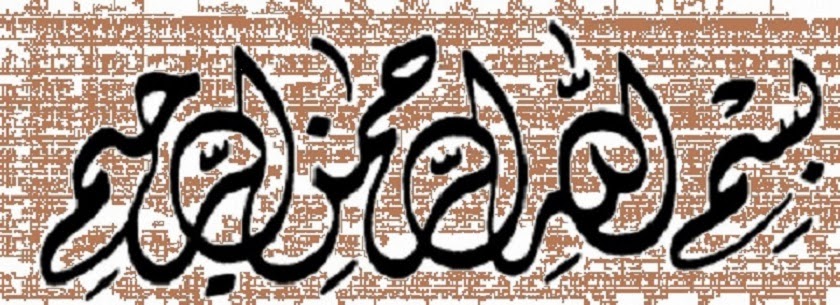By Shaykh Hussayn bin ‘Abdul-‘Azeez aal ash-Shaykh [May Allaah
Preserve him]
Imaam and Khateeb of Masjid an-Nabawee and a Senior Judge in the High Court in Madeenah
2. Therefore turn in prayer to your Lord and sacrifice (to Him only).
3. For he who makes you angry (O Muhammad), - he will be cut off (from every good thing in this world and in the Hereafter).
http://www.alharamain.gov.sa/index.cfm?do=cms.scholarsubject&schid=2&subjid=17089&audiotype=lectures&browseby=speaker
Imaam and Khateeb of Masjid an-Nabawee and a Senior Judge in the High Court in Madeenah
إِنَّا أَعْطَيْنَاكَ الْكَوْثَرَ {1}
فَصَلِّ لِرَبِّكَ وَانْحَرْ {2}
إِنَّ شَانِئَكَ هُوَ الْأَبْتَرُ {3}
1. Verily,
We have granted you (O Muhammad) Al-Kauthar (a river in Paradise);2. Therefore turn in prayer to your Lord and sacrifice (to Him only).
3. For he who makes you angry (O Muhammad), - he will be cut off (from every good thing in this world and in the Hereafter).
[Surah
Kawthar 108: 1-3]
This Surah is about a river in
Paradise in which there are many Ahadeeth which are Mutawaatir which have been
narrated.
This Surah was revealed at night in
which the Prophet [Peace and Blessings of Allaah be Upon him] came out of his
house smiling.
The scholars have differed on
whether all of the time of the Prophet [Peace and Blessings of Allaah be Upon
him] was revelation. Some said his sleep was not part of revelation. However,
this Surah was revealed at night and he came out smiling and recited the Surah
which brings good news to the people.
Al-Kawthar: Al-Kawthar is a river in Jannah. The linguistic meaning
of the word Kawthat is to have something increased, from the word Katheer. It
can be an increase in the status of something, so that the physical thing
doesn’t increase but its value does. It can refer to an increase in number or
measure.
Some said Kawthar here means the blessings
or Barakah that was given to the Prophet [Peace and Blessings of Allaah be Upon
him], however this is correct in a linguistic sense however the Ahadeeth that
talk about the river clearly show that this Surah is talking about the physical
river in Jannah.
The river has been described as a river
which is surrounded by pearls, it’s mud is musk, its whiter than milk and
sweeter than honey. It is surronded by many cups for the belivers to drink
from.
This river is physical and something
we should believe in and not use it as a methapor. Therefore, believing in a
river becomes part of our ‘Aqeedah and that the believers will drink from it
and that it coms before the Siraat on the Day of Judgement.
‘We have given you’: this refers to those who are benefitted from the river
and those who benefit from the river.
This Ayaah also refutes the view of those
who say that the Prophet [Peace and Blessings of Allaah be Upon him] has
control in the Lordship of Allaah [Ruboobiyyah] and that he has knowledge of
the unseen.
‘So turn to your Lord in
prayer’: Therefore we need to thank Allaah,
the Most High, by increasing in doing good deeds and having Tawheed with
Allaah.
‘Prayer’: meaning Salaah, others said it refers to the sacrifice
we make as part of our Hajj. It is correct to say both are for the sake of
Allaah, the Most High, alone. Others also said that this refers to the ‘Eid
Salaah.
‘Sacrifice’: meaning our sacrifice if for Allaah, the Most High,
alone. Others said it also refers to us putting our hands on or near the chest
during Salaah, some also said it refers to us looking at the ground during
Salaah.
‘Those who disgrace you
are neglected’: those who have hatred towards the
Prophet [Peace and Blessings of Allaah be Upon him] will be disgraced and
neglected.
In reality, they have nothing to
hate in the the Prophet [Peace and Blessings of Allaah be Upon him] or anything
he brought, and whoever does this has nullified his Islaam.
However, if you dislike what he came
with or an aspect of his Sunnah yet you believe, then you are still considered
as a Muslim but this person has weakness of faith.
Those who apostacise and
hate him or everything he came with then these people have left Islaam.
Added to this, if one changes the
rulings of Islaam or denies what is Haraam and Halaal, then this also acts as a
nullifer of Islaam.
‘Abtar’ means barren. Thus meaning those who hate you or hate
what you brought then they are neglected and left abandoned.
http://www.alharamain.gov.sa/index.cfm?do=cms.scholarsubject&schid=2&subjid=17089&audiotype=lectures&browseby=speaker
